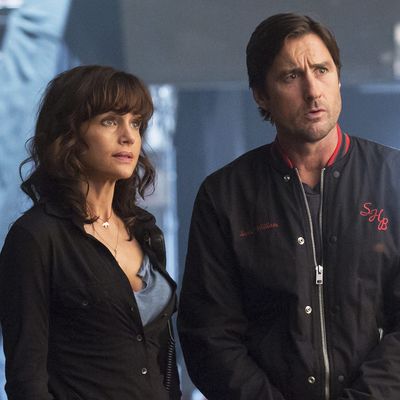
Let me just say, right upfront, that I really, really want to like Roadies. I feel about Cameron Crowe — the creator of the series and a filmmaker who has stumbled in recent years, most notably with last year’s disastrous Aloha — the way people in Cameron Crowe movies feel about the heroes in Cameron Crowe movies. I am rooting for him. I believe he is capable of greatness. To borrow the words of Renée Zellweger in Crowe’s Jerry Maguire and change them just slightly, I love him for the filmmaker he was, and for the filmmaker he almost still is. (I really liked We Bought a Zoo, and I am not ashamed to say it.) And I love the idea of watching him take his passion for music — a passion that’s been on display in all of his films, but none more so than the semi-autobiographical Almost Famous, to which Roadies can’t help but be compared — and bring it to the world of television on a weekly basis.
But the idea of Roadies is one thing, and the execution of it is another. While the first three episodes of the series — the only ones made available to critics — overflow with Crowe’s trademark optimism and contain glimmers of promise, the characters feel underdeveloped and the stakes a bit too low to keep viewers coming back. To appropriate yet another piece of dialogue from a beloved Crowe film (Say Anything), Roadies feels like it’s looking for a dare-to-be-great situation but still hasn’t found it yet.
The show travels from town-to-town with the crew working on the current tour headlined by the Staton-House Band, who, if the music writer played by Rainn Wilson in episode three is to be believed, are a semi-rootsy alt-rock group that’s slightly past their prime. But the artists aren’t what’s important here; it’s the people behind them who matter, people like Bill (Luke Wilson), the tour manager whose blood pressure spikes with every opening act that drops off the tour; production manager Shelli (Carla Gugino), who tries to keep all the backstage trains running while still making time for phone sex with her husband, who works for Taylor Swift; and Kelly Ann (Imogen Poots), an aspiring filmmaker who can’t tear herself away from the excitement of life on the road.
Of the initial trio of episodes, the first one, which debuts on Showtime this Sunday at 10 p.m., is the weakest, and the second — which, like the other two, is directed by Crowe but, unlike the other two, written by fellow executive producer Winnie Holzman — is the strongest. (Writing credits on episodes one and three go to Crowe.)
The pilot tries so hard to make a case for itself that it comes across like a nervous job applicant eager to convey its many qualifications. Hence, the sexual tension between Bill and Shelli is clumsily highlighted for viewers instead of subtly suggested. (“You two are in denial,” says a roadie played by Finesse Mitchell when the two awkwardly insist they aren’t romantically involved.) Characters often speak in platitudes instead of just talking to each other. “It’s my opinion that you need two things to survive in life: oxygen and family. Everything else is dessert.” This is something that the tour-bus driver, played by Luis Guzman, announces less than five minutes into the episode. Via the soundtrack choices (which are really solid, by the way) and the speeches made by veteran roadie Phil (Ron White), who can barely speak the name Ronnie Van Zant without choking up, Roadies makes its reverence for good, old-fashioned rock-and-roll abundantly, abundantly clear.
That all said, in subsequent episodes, it feels like Crowe, with that able assist from Holzman in the second installment, settles down a bit. There are some genuinely laugh-out-loud moments, including a story about a teleprompter malfunction at a Sting concert and some completely over-the-top rudeness from Wilson’s rock critic, Bryce Newman. (Question, though: Do all critics have to be depicted on TV and in movies as completely rude assholes who get off on writing scathing reviews and/or hot takes? Asking for a friend.) The arrival of new opening acts plucked from the real world — Reignwolf in episode two, Lindsey Buckingham in episode three — also gives Roadies the opportunity to demonstrate the transcendence of live performance in a way that a million speeches about the power of rock cannot. Even in the pilot, flawed though it is, there’s a lovely montage toward the end that toggles between the image of Kelly Ann running back to work and a montage she created of famous movie running moments. It’s set to Pearl Jam’s “Given to Fly,” which makes the whole thing so goddamned Cameron Crowe it hurts. But mostly in a good way.
We’ve become accustomed to TV dramas that immediately raise a tantalizing question that draws us in. Will these Russian spies get caught by their FBI neighbor? Will this clearly addled dude join that group of anarchic hackers, assuming those anarchic hackers are not a hallucination? Who will ultimately claim the Iron Throne and will I ever be able to keep track of all the characters that are trying to do so, because there are A LOT of them?
Roadies doesn’t really have that. It’s more about ambling from gig to gig, cuing up the right song, hanging out during sound check, and honoring sincerity to a degree that puts Linus Van Pelt’s pumpkin patches to shame. Roadies needs to flesh out all of its characters more effectively, including the recurring groupie Natalie, who may as well be called Manic Pixie Dream Stalker. She’s no Penny Lane and this show is no Almost Famous. But it feels like it’s almost something. That’s enough to justify giving Roadies a few more chances to hit its stride.


